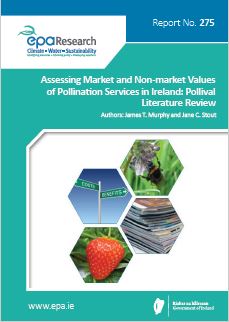Authors: James T. Murphy and Jane C. Stout
Summary: Ecosystems provide various essential amenities, including food and water, and other valuable services to human societies (Joppa et al., 2016). However, ecosystems are increasingly threatened by human population growth, increasing urbanisation and intensity of production, and globalisation, which have resulted in loss and fragmentation of biodiversity, pollution and degradation of habitats, and climate change (Ripple et al., 2017).

Pollination has been identified as a key ecosystem service that is threatened globally by anthropogenic activities. Estimation and consideration of economic benefits of pollination can contribute to land-use decision-making to better support pollinator biodiversity and the sustainability of pollination service delivery. The Pollival literature review assesses approaches to valuing nature and focuses on methods for valuing pollination services. The financial contribution of pollinators and pollination services to crop yields, and the implications of pollinator loss for food production, have been estimated for a range of crop types globally, using a variety of methods. Less attention has been afforded to non-market values of pollinators and pollination services, and integrating monetary and other values remains a challenge.
“Valuing and protecting our natural environment” was articulated as a key aim of the Environmental Protections Agency’s (EPA) 2012 State of the Environment Report, but in 2016 it was acknowledged that the value of ecosystem services was still not normally integrated into business decisions and policymaking. Furthermore, the European Union (EU) Biodiversity Strategy to 2020, the EU 7th Environmental Action Programme (EAP), the Convention on Biological Diversity’s Aichi Targets and the Paris Agreement all highlight the need to consider the value of nature. The Pollival literature review considers different approaches to valuing the market and non-market value of pollinators and pollination services for integration into environmental accounts, justification for financial input to conservation, and general appreciation of the value of nature among public and private bodies. Pollinators and their services are useful exemplars, as they provide tangible case studies that resonate with private citizens, businesses and policymakers.
The identification of approaches to valuing market and non-market use and non-use values of pollinators and pollination services, as outlined in the Pollival literature review, is a key step in efforts to incorporate the value of nature into public and private decision-making. This review details the state of the art with regards to valuing pollinators and pollination services and highlights data needs and knowledge gaps, particularly with respect to integrating values calculated using different metrics. Ultimately, by understanding both the financial and the non-financial contributions of pollinators and pollination services to human society and well-being, the impacts of spatio-temporal changes in service delivery can be predicted and informed decision-making based on cost–benefit analyses can be progressed.
https://www.epa.ie/media/epa-2020/publications/research/Research_275_Thumbnail.jpg